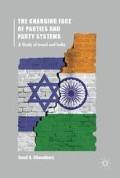Abstract
Proportional representation in Israel has ensured participation of the minorities, the Arabs, in the Knesset. The Arabs, constituting 22 per cent of the Israeli population, have become the real beneficiaries of the principle of proportional representation. However, the division of Arabs into different parties has weakened their parliamentary representation by depriving them a decisive say in the parliamentary politics of Israel. However, the increasing electoral threshold from 1 to 3.25 per cent brought about consolidation of the Arab votes as well as unity of the Arab parties, thereby significantly increasing their electoral share in the 2015 Knesset elections. The real challenge for the Arab parties in the parliamentary politics of Israel is how to continue with its united electoral fight democratically by supplementing the Arab interests with the Jewish interests simultaneously.
Access this chapter
Tax calculation will be finalised at checkout
Purchases are for personal use only
Notes
- 1.
Maki was a Communist party of Arabs. Since it fought formative Knesset elections as an ally of Mapai, it became part of the socialist block until 1965 when it transformed into Rakah initially and finally into Hadash in 1997.
- 2.
After his expulsion from Mapam, Moshe Sneh’s the Left Socialist Party joined Maki in the Knesset elections in 1955.
- 3.
The Lavon affair related to the controversial order of the Israeli Defence Minister Pinchas Lavon asking the IDF agents to carry out the sabotage activities against the Egyptians in 1954. The Egyptians caught these agents and killed some of them. The incident defamed Israel in international arena and seriously questioned its diplomatic stature. Pinchas Lavon was asked to resign notwithstanding his claim that the orders were being passed by the then IDF Chief.
References
Ghanem, As’ad., & Ozacky-Lazar, S. (Eds.). (1997, June). The Arab vote in the election to the 14th Knesset, 29 May 1996 – Data and analysis. (trans: Krausz, J.). No. 5. Tel Aviv: The Moshe Dayan Center for Middle Eastern and African Studies.
Ghanem, A.’a., & Ozacky-Lazar, S. (2002). Israel as an ethnic state: The Arab vote. In A. Arian & M. Shamir (Eds.), The elections in Israel 1999. Albany: State University of New York Press.
Herzog, H. (1995). Penetrating the system: The politics of collective identities. In A. Arian & M. Shamir (Eds.), The elections in Israel 1992. Albany: State University of New York Press.
Isaac, R. J. (1981). Party and politics in Israel: Three visions of a Jewish state. New York: Longman.
Lustic, I. S. (1990). The changing political role of Israeli Arabs. In A. Arian & M. Shamir (Eds.), The elections in Israel 1988. Boulder: Westview Press.
The Israel Project; The Knesset. (2012, January). Moment Magazine. Wikipedia.
Author information
Authors and Affiliations
Rights and permissions
Copyright information
© 2018 The Author(s)
About this chapter
Cite this chapter
Choudhary, S.K. (2018). The Arab Parties (Arab Block). In: The Changing Face of Parties and Party Systems . Palgrave Macmillan, Singapore. https://doi.org/10.1007/978-981-10-5175-3_12
Download citation
DOI: https://doi.org/10.1007/978-981-10-5175-3_12
Published:
Publisher Name: Palgrave Macmillan, Singapore
Print ISBN: 978-981-10-5174-6
Online ISBN: 978-981-10-5175-3
eBook Packages: Political Science and International StudiesPolitical Science and International Studies (R0)

